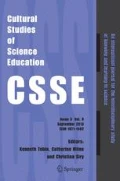Abstract
In this paper, we explore themes that emerged while reading “How does one recognize contextual mitigating factors (CMFs) as a basis to understand and arrive at better approaches to research designs” (Gallard Martínez et al. this issue). Specifically, we consider the potential for the CMF analysis method to help researchers be more critical about how their ontological–epistemological–axiological (OEA) stance informs their tactical understandings about CMFs and how these understandings shape research questions and design. We discuss the value of autobiographical reflection for becoming aware of contextual constructs and situated phenomena and consider the importance of engaging in the practice of radical doubt to question unexamined assumptions in the research we produce and consume. In presenting this discussion of Gallard Martínez et al. (this issue), we raise questions about methodological affordances and limitations of the CMF approach and draw implications for individual and collective responsibility for both disseminating scholarship in channels that support scholars to attend to CMFs in their work and for rethinking what kinds of research we choose to consume and be informed by.
초록
본 논문에서 연구자들은 “How does one recognize contextual mitigating factors (CMFs) as a basis to understand and arrive at better approaches to research designs” (Gallard Martinez 등, 이번 호) 에서 제기되는 담론을 탐색하였다. 원 논문은 사회문화적, 경제적, 역사적, 정치적 맥락이 연구 자료를 이해하고 비판함에 있어 지대한 영향을 미친다고 강조하며, 이를 완화하기 위한 방법으로 CMF (contextual mitigating factors) 분석법을 제안하였다. CMF 분석법을 통해 연구자는 자신의 존재론적-인식론적-가치론적 입장을 전략적으로 이해하고 자신의 입장이 연구 문제 및 설계를 구성하는데 미치는 영향을 비판적으로 탐색할 수 있다. 연구자들은 자전적 글쓰기를 통하여 연구의 맥락적 요소와 상황화된 현상(situated phenomena)를 파악하고 연구에 포함된 검증되지 않은 가정들에 의문을 제기하는 철저한 의심을 할 수 있다고 간주하였다. 연구자들은 Gallard Martinez 등(이번 호)의 연구를 논의하면서 CMF 분석법이 방법론으로 활용될 때의 강점과 한계에 대해 논의하였다. 또한 CMF를 적용하는 연구들이 수행되고 게재될 수 있는 창구를 확보하기 위해서는 연구자 개인 뿐 아니라 연구자 집단이 책임의식을 가져야 함을 시사하였다.
Similar content being viewed by others
References
Bourdieu, P. (1986). The forms of capital. In J. G. Richardson (Ed.), Handbook of theory and research for the sociology of education (pp. 241–258). New York, NY: Greenwood.
Erikson, F. (1986). Qualitative methods in research on teaching. In M. C. Wittrock (Ed.), Handbook of research on teaching (pp. 119–158). New York, NY: Macmillan.
Gallard Martínez, A.J., Pitts, W.B., Brkich, K.M., & Ramos de Robles, S.L. (this issue). How does one recognize contextual mitigating factors (CMFs) as a basis to understand and arrive at better approaches to research designs? Cultural Studies of Science Education. https://doi.org/10.1007/s11422-018-9872-2.
Hill Collins, P. (1990). Black feminist thought: Knowledge, consciousness, and the politics of empowerment. Boston, MA: Unwin Hyman.
hooks, b. (1984). Feminist theory: From margin to center. Cambridge, MA: South End Press.
Hundt, D. (2016). Public opinion, social cohesion, and the politics of immigration in South Korea. Contemporary Politics,22(4), 487–504. https://doi.org/10.1080/13569775.2016.1186346.
Kang, D. Y., & Martin, S. (2018a). Understanding structures preventing teachers from supporting culturally and linguistically diverse students in science learning. The Journal of Learner-centered Curriculum and Instruction,18, 563–592.
Kang, D. Y., & Martin, S. (2018b). Improving Learning opportunities for special education needs (SEN) Students by engaging pre-service science teachers in an informal experiential learning course. Asia Pacific Journal of Education,38, 319–347. https://doi.org/10.1080/02188791.2018.1505599.
Kim, J. (2015). Ethnic brothers or migrants: North Korean defectors in South Korea. Joint U.S. Korea Academic Studies (p. 98–111). Washington, DC, USA: Korea Economic Institute of America. http://www.keia.org/sites/default/files/publications/ethnic_brothers_or_migrants_north_korean_defectors_in_south_korea.pdf. Accessed 17 July 2019.
Martin, S. (2005). Not so strange in a strange land: An autobiographical approach to becoming a science teacher in an urban high school. In K. Tobin, R. Elmesky, & G. Seiler (Eds.), Improving urban science education: New roles for teachers, students, and researchers (pp. 225–243). New York: Rowman & Littlefield Publishers Inc.
Martin, S., & Chu, H. E. (2015). Asia-Pacific Science Education (APSE): Expanding opportunities for publishing science education research. Asia-Pacific Science Education,3, 1–18. https://doi.org/10.1186/s41029-015-0006-9.
Martin, S., & Siry, C. (2011). Networks of practice in science education research: A global context. Journal of Research in Science Teaching,48, 592–623. https://doi.org/10.1002/tea.20425.
McCall, L. (2005). The Complexity of Intersectionality. Signs Journal of Women in Culture and Society.,30, 1771–1800.
Park, J., Chu, H. E., & Martin, S. (2016). Exploring how Korean teacher’s attitudes and self-efficacy for using inquiry and language based teaching practices impacts learning for culturally and linguistically diverse students: Implications for science teacher education. EURASIA Journal of Mathematics, Science and Technology Education,12, 1799–1841. https://doi.org/10.12973/eurasia.2016.1536a.
Sung, J., & Mo, M. H. (2014). Resettling in South Korea: Challenges for young North Korean refugees. The Asan Institute for Policy Studies.,24, 1–19.
Acknowledgements
This work was supported by the Ministry of Education of the Republic of Korea and the National Research Foundation of Korea (NRF-2016S1A3A2925401).
Author information
Authors and Affiliations
Corresponding author
Additional information
Publisher's Note
Springer Nature remains neutral with regard to jurisdictional claims in published maps and institutional affiliations.
Lead Editor: Emilia Alfonso.
This review essay addresses issues raised in Alejandro José Gallard Martínez, et al.’s paper entitled: How does one recognize contextual mitigating factors (CMFs) as a basis to understand and arrive at better approaches to research designs. https://doi.org/10.1007/s11422-018-9872-2.
Rights and permissions
About this article
Cite this article
Martin, S.N., Kang, D.Y. Rethinking approaches to research: the importance of considering contextually mitigating factors in promoting equitable practices in science education research. Cult Stud of Sci Educ 15, 569–582 (2020). https://doi.org/10.1007/s11422-019-09949-4
Received:
Accepted:
Published:
Issue Date:
DOI: https://doi.org/10.1007/s11422-019-09949-4




